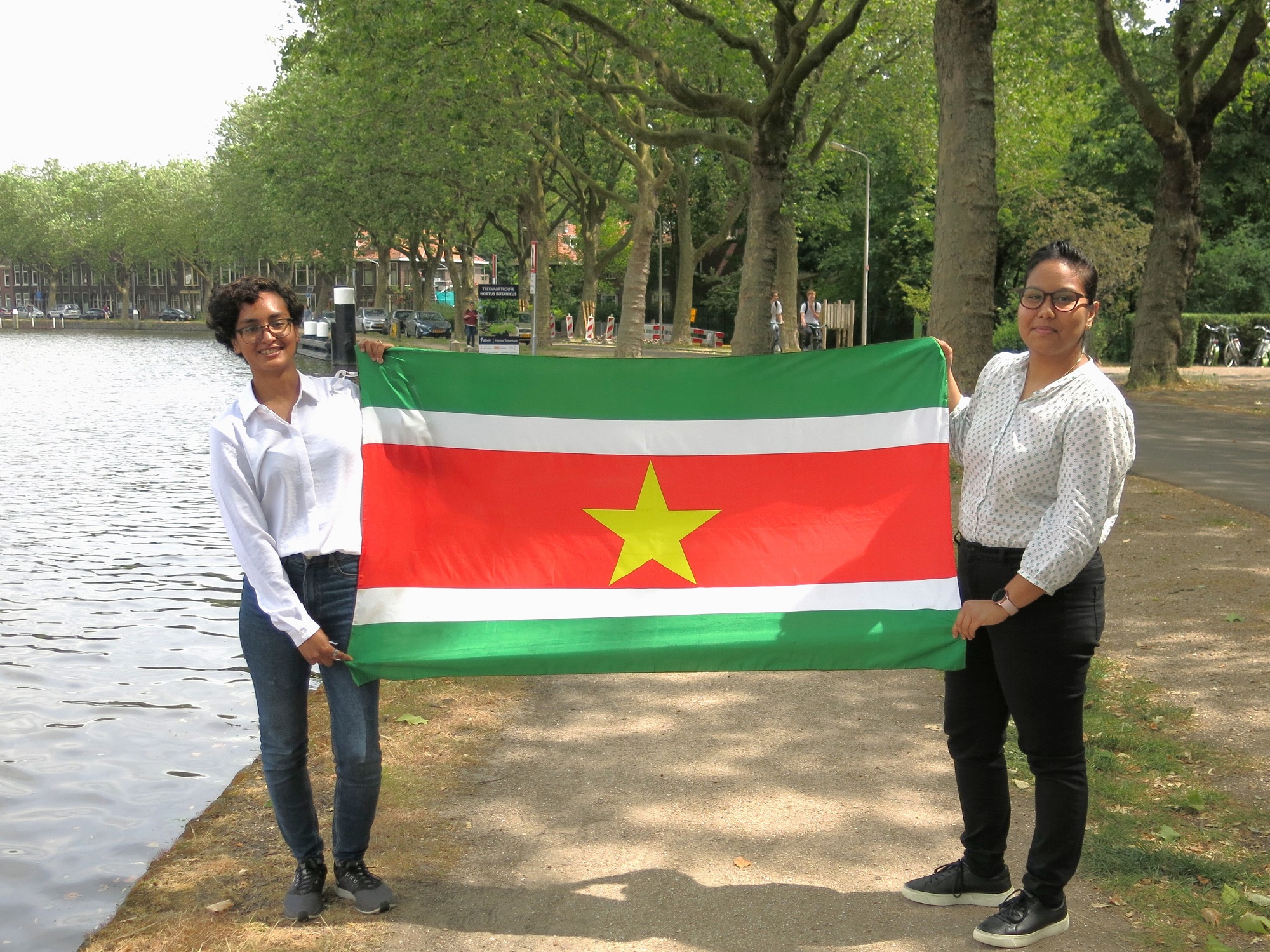Who are the people who study or work at TU Delft? We meet them in Humans of TU Delft. These Surinamese students help organise an event for the 150th anniversary of Keti Koti.
Tatjana Sommandas (left) & Prijanti Moensi (right) with the Surinamese flag. (Photo: Heather Montague)
English only
Prijanti Moensi: “This is my third year in SUBEST Delft (in Dutch) and I am currently the President. In April, I finished my bachelor in Systems Engineering, Policy Analysis & Management (Faculty of Technology, Policy & Management) and in September I am going to start a master’s in Industrial Ecology at Leiden University.”
Tatjana Sommandas: “I’m the current Commissioner of Education for SUBEST Delft and I have also been involved for three years. I’m in the second year of a master’s in Chemical Engineering (Faculty of Applied Sciences) and I also work full-time for a company. SUBEST Delft was unofficially founded eight years ago by two students from Suriname. It started with friends organising a couple of events and lectures with companies. Then six years ago SUBEST Delft was officially started and we have two areas of focus. First, we help students that are already studying at TU Delft and we provide them with both social and educative events. It’s really nice to have a community like this here. But we also focus on the students that might come from Suriname to the Netherlands. Every year we organise an information session in Suriname to inform people about studying at TU Delft and the things they need to take into account when coming here.”
Prijanti: “This year we celebrate the 150th anniversary of Keti Koti. In Surinamese, Keti Koti means ‘broken chains’ and it marks the day that slavery was abolished in Suriname. It was on 1 July in 1863 that enslaved people were free, but they still had to work 10 more years on the plantations under state supervision. They were officially free on 1 July 1873. On that day, we try to commemorate and celebrate this historic event by learning more about the history, but also by celebrating with great food and great people. Last year in the Netherlands, various parties gave an official apology for slavery and their involvement in the slave trade and this was a historic moment for all Surinamese people, including the descendants of the enslaved people. This was an important acknowledgement that shows we are getting where we need to be. It’s also nice to see that there are different activities organised around the Netherlands to mark this day, to see that the Dutch community is willing and open to learn more about the history we share with them and the involvement in the slave trade. We can learn and be more aware of the things we have in common.
‘The event is open to everyone so we hope to see lots of people there’
We are planning a big celebration this year together with X and Studium Generale TU Delft. The event will be held on 30 June at X. We will start with a workshop on making heri heri, which is a dish that enslaved people often ate in Suriname that consists of fish, sweet potatoes, cassava, and an egg. Vegan and vegetarian options will also be provided. This will be done in collaboration with KIP Republic, the organisation behind Free Heri Heri For All which provides free heri heri across the Netherlands every year for Keti Koti. Then together with PPI Delft, the Indonesian Student Association, we will give a brief introduction to the slave trade and the history we share. Many of their forefathers came to Suriname as indentured labourers, which can also be seen as a kind of slavery. They will share their stories and perspectives and then we will all enjoy dinner together.”
Tatjana: “During dinner we want to continue the conversation so we have prepared some statements to get people started. It’s a moment to share different sides of the story, like if you have a connection with Suriname or its people. But if you just want to learn, it’s also a chance to know a bit more from someone close up. The event is open to everyone so we hope to see lots of people there. You don’t have to be a student or even alumni or even be linked to TU Delft. It’s in English because we wanted to make it accessible to everyone.”
Prijanti: “I think if you want to enjoy delicious food and you want to learn more about our culture, and our history, the history we share with a lot of people in the community, then we welcome you to join the event on 30 June.”
Want to be featured in Humans of TU Delft? Or do you know someone with a good story to tell? Send us an e-mail at humansoftudelft@gmail.com.
Heather Montague / Freelance writer



Comments are closed.